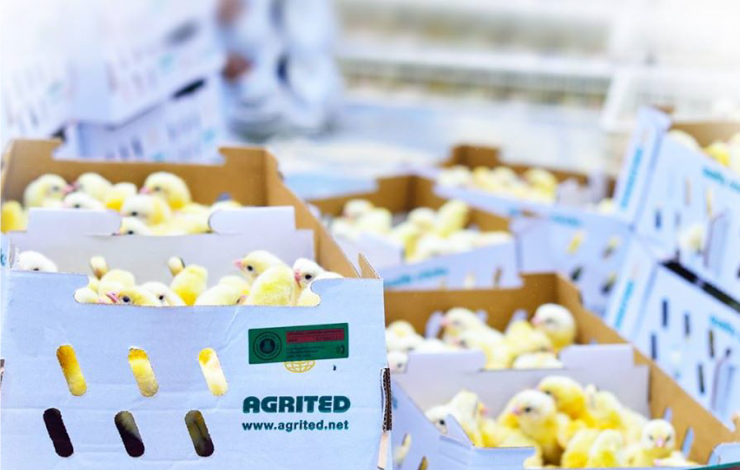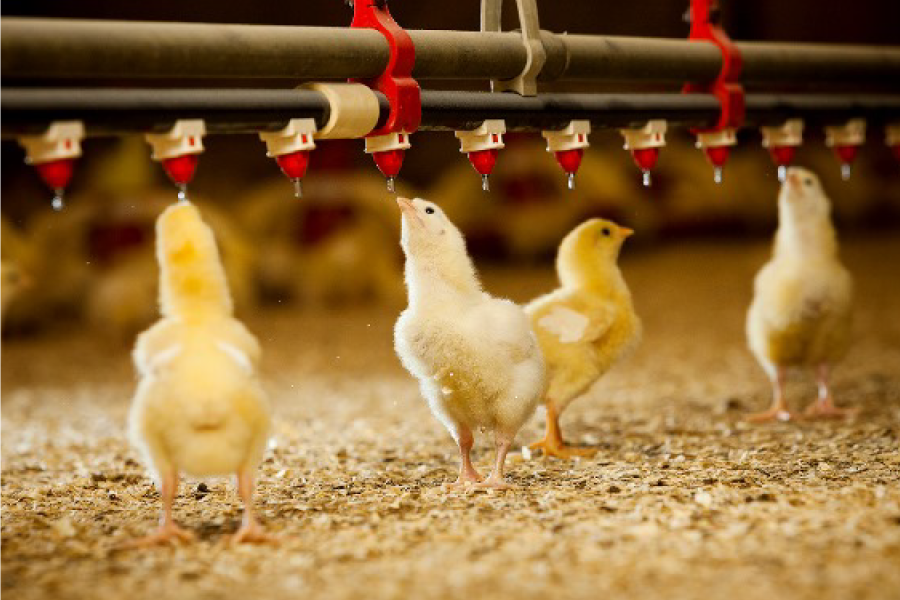What You Need To Know About Broiler Brooding
Brooding is a very crucial stage in poultry farming. What happens before and after the chicks arrive will impact their health, livability, and performance, so it is in our interest to provide day-old chicks with an adequate environment.
There are things we need to put in place before the arrival of the broiler chicks, to make sure they settle in well and prevent problems at a later stage.
Here is what you should do before the chicks' arrival:
- Make sure to clean and disinfect your pen or house thoroughly.
- Spread litter evenly to a depth of 2-5 cm (0.8-2 inches).
- Your feed form should be a dust-free sieved crumb, or 2 mm (0.06 inches) mini pellet.
- Pre-heat the pen or house at least 24 hrs before chick arrival.
- Arrange the equipment to allow unrestricted access to feed and water.
When the chicks arrive, you should weigh a sample and record their live weight and CV% / Uniformity.
Check the chick vent temperature is between 39.4-40.5 degrees centigrade, and place the chicks evenly onto paper. Ensure feed and water is available and that light intensity is between 30-40 lux.
WHAT TO DO AFTER PLACING THE CHICKS
When the birds have settled into their new environment, check their behavior for 1-2 hours, and adjust the conditions according to chick behavior.
When the chicks are tightly-packed together, it means that they are too cold. They become distressed and noisy.
If they avoid the heat source, it means they are too hot; they become quiet, spread their wings, and pant.
The chicks should neither be too hot nor too cold and evenly-spread across the house/pen.
You should provide ventilation without drafts, to provide fresh air, remove waste gas, excess moisture, and heat.
Supply small and frequent top-up of feed, check water supply is running and that supplementary drinkers contain freshwater.
Check crop fill. In 2 hours, 75% of the birds should have full crop fill, 80% in 4 hours, more than 80% in 8 hours, more than 85% in 12 hours, and more than 95% at 24 hrs.
For best results during brooding, a farmer should buy quality chicks, that are clean after hatch, stand firmly and walk well, alert and active, free of deformities, and vocalize contently.
THE FIRST TEN DAYS
If the paper placed on the floor in the house does not disintegrate naturally, then it should be removed from the pen house from day three (3) onward.
Brooding rings, if used, should be expanded from day three (3) of age, and completely removed at 5-7 days of age.
Endeavor to top up the feed on the paper/feed tray at regular intervals during the first 3 to 4 days.
Birds should be on the main-feeding system by six (6) to seven (7) days of age.
Gradually change to a good quality pellet, once transfer to the main-feeding system is complete.
Provide 23 hours of light for the first seven (7) days to encourage feed and water intake.
FEEDING PROGRAM
A good quality starter feed will support early growth and physiological development. Then target weight, good health, and welfare will be achieved.
Starter formulations should be based primarily on promoting biological performance and profitability, not feed costs.
Starter feed should be from 0 to 10 days of age.
Note that transition from starter to grower feed involves a change in texture and nutrient density and needs to be managed carefully to avoid loss of performance.
Note that: Poor physical feed form will have a negative impact on broiler performance.
DRINKING SYSTEM
Monitor the feed to water ratio daily.
The ideal water temperature should be 18 degrees centigrade - 21 degrees centigrade.
Broilers should not have to travel more than 2 m (6.6 ft) to get water.
The Water level should be 0.6 cm BELOW the top of the drinker until ten (10) days of age. After ten (10) days, there should be 0.6 cm of water in the base of the drinker.
Drinkers should be kept well-maintained and clean at all times.
In hot weather, water consumption of broilers will increase and the drinker lines should be flushed at regular intervals to keep water cool.
DECREASE THE RISK OF DISEASE
During brooding, broilers are susceptible to diseases because their immunity is not strong at a young age, so there are measures that must be taken in other to prevent infection of the birds.
- Prevent unauthorized access to the farm.
- Shower on to the farm and change clothing.
- Maintain a record of visitors.
- Wash and sanitize hands and boots when entering and leaving houses.
- Clean and disinfect all equipment before bringing in to the house.
- Visits the youngest flock first.
- Whenever possible use ''all-in/all-out'' placement cycle.
- Downtime between flocks will reduce contamination on the farm.
- Clean up feed spills as soon as they occur
- Maintain an effective rodent/vermin control program.
VACCINATION
Day 1 - ND-VH+IBH120 - Spray on boxes at the hatchery, could be done on the farm.
Day 10 - ND-VH - Drinking water. The Water system should be cleaned prior to vaccination.
OBSERVATIONS AND LIKELY CAUSES
SMALL CHICKS (Day 1-4)
Likely cause:
- Weak chicks
- Inadequate feeders and drinkers
- Inadequate feed and water levels
- Equipment location and maintenance issue
- Inappropriate brooding temperature and environment
PROBLEM-SOLVING
High early mortality - Causes include:
- Poor chick quality: Check the hatchery practice and egg hygiene.
- Incorrect brooding: In this case, re-adjust the brooders.
- Disease: When faced with this problem, perform post mortem on the dead chicks to know the cause of the disease. Take your veterinary advice.
- Appetite: measure and achieve target crop fill levels, check feed availability, amount, and space.



12 Comments
Ogunyemi Hannah Olabimpe
This is a very good write up.
Abubakar Argungu
Very good information to us, the beginner’s into the business
Kabiru bello
I am happy with your products that is agrited
Alhassan Arikya
I have gained additional knowledge.
Thanks
Zulaikha K.Lawal
Very educative thanks a lot.
Dearsley Dabale
Can I have this in pdf
Precious
How can I book
AGRITED
Please call us on 017001731 for booking and inquiries
Starla Thorny Minier
Wow! This could be one particular of the most beneficial blogs We’ve ever arrive across on this subject. Actually Magnificent. I’m also a specialist in this topic so I can understand your effort. Starla Thorny Minier
AGRITED
Thank you Starla for the review, your words are greatly appreciated.
erotik
Ich lese Ihren Artikel mit Interesse, danke. Arabel Dur Barbe
AGRITED
Vielen Dank für den Kommentar, Sie sind herzlich willkommen